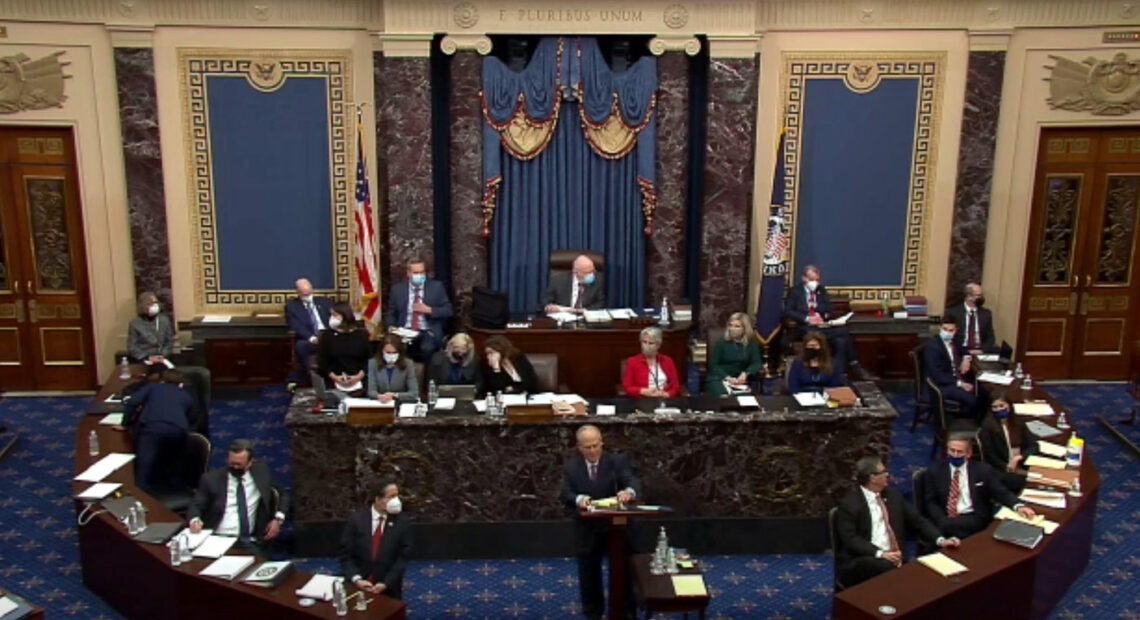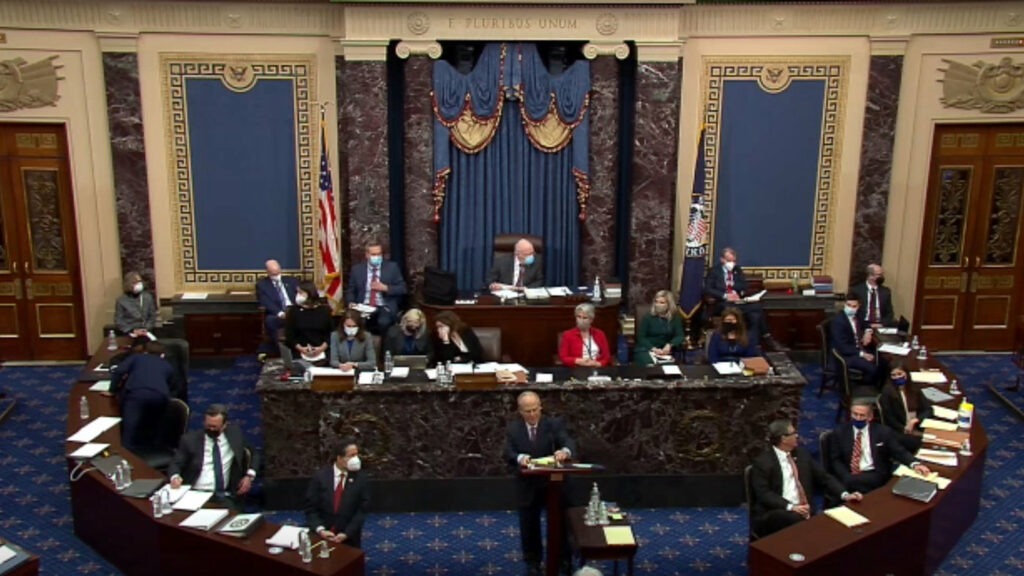
Impeachment Trial Day 1: Six Republicans Join Democrats In Saying It’s Constitutional
IMPEACHMENT TRIAL: Watch Live Here
BY BARBARA SPRUNT & BRAKKTON BOOKER
The second impeachment trial of Donald Trump will move forward after the Senate voted Tuesday that the trial of a former president is constitutional.
Trump was impeached by the House for inciting an insurrection at the U.S. Capitol on Jan. 6.
The Senate Tuesday vote was 56-44, with six Republicans joining all 50 Democrats.
The Republicans who voted for the trial’s constitutionality were Sens. Susan Collins of Maine, Bill Cassidy of Louisiana, Lisa Murkowski of Alaska, Mitt Romney of Utah, Ben Sasse of Nebraska and Pat Toomey of Pennsylvania.
ALSO SEE: Impeachment trial live updates
Cassidy’s vote is notable because he was the only senator to switch sides from an early procedural vote on the trial’s constitutionality.
The Louisiana Republican told Capitol Hill reporters that he thought Trump’s legal team did “a terrible job” on Tuesday.
The trial will begin its next phase on Wednesday at noon ET. House impeachment managers, followed by Trump’s defense team, will have up to 16 hours over two days to make their case for conviction or acquittal.
Here’s a look at what happened on Day 1.
It started with a video
House impeachment managers began by showing members of the Senate a graphic video that walked through the events that took place on Jan. 6, including Trump’s comment to supporters ahead of the riot that “we will stop the steal,” referencing his baseless claims of election fraud.
The video documents the cascading events of the day, including Trump supporters erecting a makeshift gallows with a noose, breaching the Capitol, chanting “No Trump, no peace,” using American flags to break the building’s windows and a police officer screaming in pain as he was attacked.
Interspersed throughout the disturbing footage were videos and tweets from Trump that day, including his comment to supporters to “go home. We love you. You’re very special.”

The Senate voted Tuesday that the trial of former President Donald Trump is constitutional and that he can be subject to the Senate as a court of impeachment.
CREDIT: Handout/Getty Images
After the video, the lead impeachment manager, Rep. Jamie Raskin, D-Md., told senators that Trump’s actions constitute high crimes and misdemeanors.
“If that’s not an impeachable offense, then there is no such thing,” Raskin said.
Democrats’ argument
Ahead of the trial, Democrats previewed that their argument would be a visceral one, based largely off of public evidence. The video set the tone of that strategy, immediately taking lawmakers who experienced the attack back to the events of the day.
House managers also addressed scholarly interpretations of the Constitution, arguing there is consensus among legal experts that a trial of a former president is, in fact, constitutional.
Raskin, a former constitutional law professor, dismissed claims that you can only try a president while they are in office.
“Their argument is that if you commit an impeachable offense in your last few weeks in office, you do it with constitutional impunity,” he said. “You get away with it.” He called this the “January exception” to impeachment.
Democrats ended their arguments for the day on an emotional appeal from Raskin. He tearfully recounted his family’s experience during the attack, in which he was separated from his 24-year-old daughter and son-in-law. “They thought they were going to die,” he said.
Raskin said the deadly events on that day “cannot be the future of America.”
Defense strategy
Trump’s lawyers offered an at-times-rambling defense of the former president that was multipronged: that the trial itself is unconstitutional, that Trump’s comments about the election are protected under the First Amendment, and that Trump was not responsible for inciting the mob that breached the Capitol.
Bruce Castor, one of Trump’s attorneys, delivered a meandering and long-winded opening argument, saying that the effort to try Trump was a partisan maneuver that could come back to haunt Democrats.
“The Republicans might regain the House in two years,” he said, alleging there would be pressure for the GOP to respond with further impeachments.
“The political pendulum will shift one day,” Castor said. “And partisan impeachments will become commonplace.”
Another Trump attorney, David Schoen, spoke at length about constitutional issues, trying to make the case that the Senate does not have jurisdiction to try “private citizen” Trump.
And he played his own video montage of Democrats over the years calling for Trump’s impeachment, and argued the trial will only further divide America.
Trump’s lawyers argue it’s over 2024
Former President Donald Trump’s legal defense team claims the House of Representatives moved to impeach him because the Democrats are afraid of facing Trump in 2024.
“Let’s understand why we are really here,” attorney Bruce Cantor said on the Senate floor Tuesday. “We are really here because the majority in the House of Representatives does not want to face Donald Trump as a political rival in the future.”
Trump’s legal team also argued that his historic second impeachment trial in the Senate should not move forward because their client is no longer president. Castor accused Democrats of ignoring jurisdictional and due process “in order to get to the part of the Constitution that allows removal.”
“Why is the majority of the House of Representatives afraid of the American people?” Cantor asked, pointing to the fact that Biden is the current occupant of the White House, not his client.
“The reason why I’m having trouble with the argument [for a trial] is the American people just spoke and they just changed administrations.”
Fellow Trump defense attorney David Schoen picked up on this theme, telling Senators that if House Democrats truly wanted to find out who was responsible for the attack on the Capitol, then they would wait for investigations to be completed.
“A great many Americans see this for exactly what it is: a chance by a group of partisan politicians seeking to eliminate Donald Trump from the American political scene and seeking to disenfranchise 74 million-plus American voters,” Schoen said, referring to the number of votes Trump received in the 2020 election.
“They hated the results of the 2016 election and want to use this impeachment process to further their political agenda,” Schoen said.
Trump is facing a single article of impeachment, charging that he is directly responsible for inciting his supporters to attack the U.S. Capitol on Jan. 6. Prior to the assault on the seat of the U.S. government, Trump addressed supporters at a “Stop the Steal” rally.
“You’ll never take back our country with weakness,” Trump said to the crowd the same day lawmakers were working to certify President Biden’s electoral victory.
“You have to show strength and you have to be strong,” he added.
House impeachment managers said the trial against Trump must continue, otherwise the Senate will create a so-called “January exception” precedent, which would essentially allow sitting presidents to commit impeachable acts with impunity in the final days before they leave office.
The Senate ultimately voted 56-44 to allow the impeachment trial to proceed, largely along party lines.
Though the Democrats control the chamber, they do not have enough votes to convict Trump. In order for that to happen, 17 Republican senators must join all Democrats to reach the required two-thirds, which is unlikely.
Copyright 2021 NPR. To see more, visit npr.org















